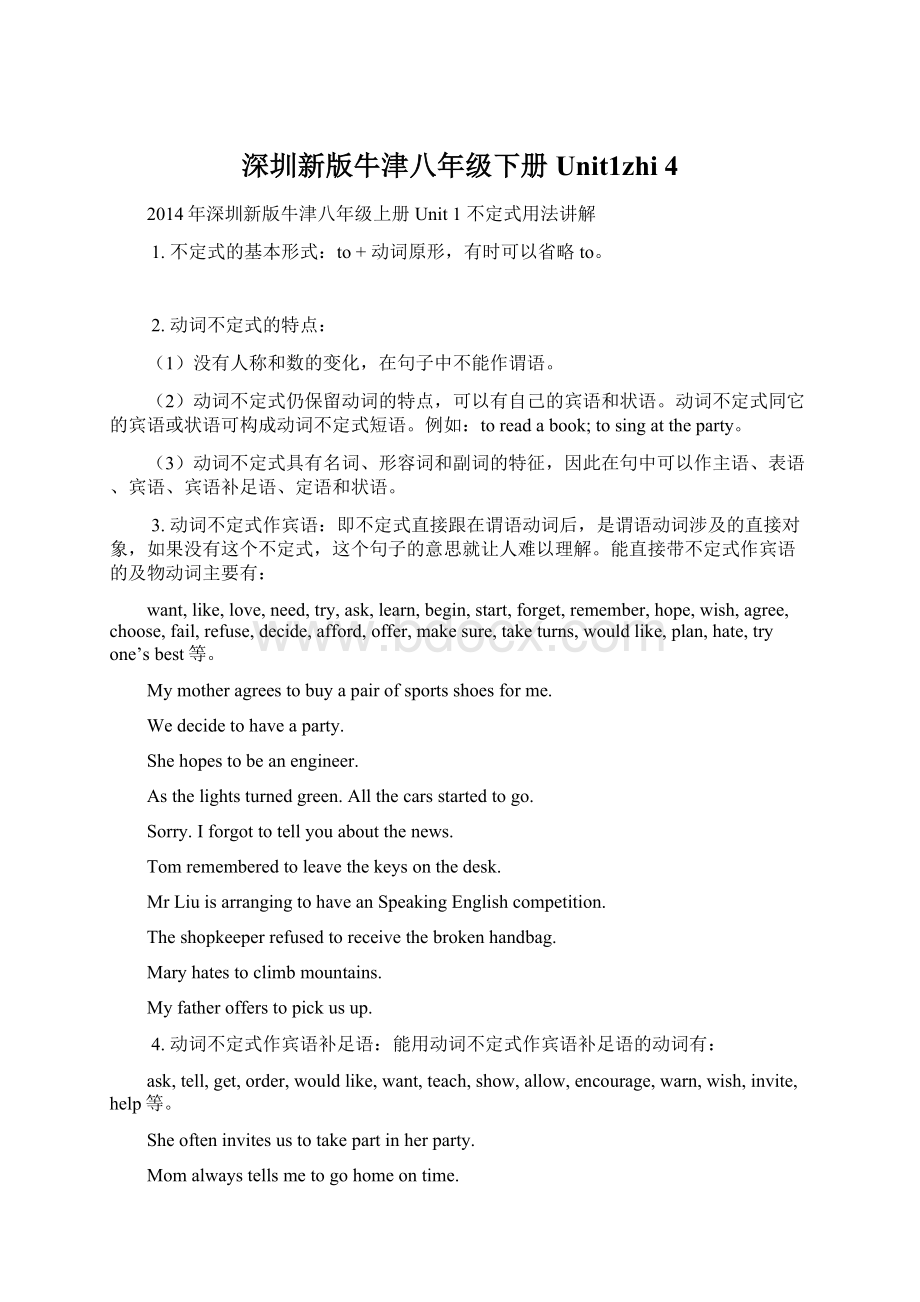深圳新版牛津八年级下册Unit1zhi 4Word格式.docx
《深圳新版牛津八年级下册Unit1zhi 4Word格式.docx》由会员分享,可在线阅读,更多相关《深圳新版牛津八年级下册Unit1zhi 4Word格式.docx(15页珍藏版)》请在冰豆网上搜索。

Ourteachersencouragedustoworkhardonoursubjects.
5.动词不定式作宾语补足语省略to的场合:
(1)作动词let,make,have,feel,hear,see,watch,notice等的宾语补足语时,动词不定式不带to。
Lethimdothework.
Hemademeworkdayandnight.
Isawhimfalloffthebike.
(2)作动词help的宾语补足语时,动词不定式可带to,也可不带to。
Hedidn’thelpme(to)mendthebike.
Youhavehelped(to)protectourenvironment.
6.动词不定式的否定形式:
notto+动词原形
Tellhimnottobelate.
Iwilltrynottoreadinbed.
Remembernottowastewater.
7.动词不定式作状语:
即不定式直接跟在谓语动词后,仅对谓语动词起一个补充说明的作用,如果没有它,句子意思仍然完整,它不像作宾语那样,与谓语动词有着密切的关系。
(1)表示目的:
Thedoctorcametooperateonher.
Hehasgonetotowntodosomeshopping.
Isatdowntohavearest.
Hestoppedtohavealook.
Herushedintotheroomtosavethegirl.
Theymovedawaythestonetoletthetrafficgo.
Hegotupearlytocatchthetrain.
(2)表结果:
Thegirlcriedtomakehermotherangry.
(3)表示程度:
Sheistootiredtowalkanyfarther.
Sheisstrongenoughtocarrytheheavybox.
(4)表示原因:
Iwassurprisedtoreadthenews.
能带不定式作状语的形容词有:
glad,happy,pleased,angry,clever,careful,surprised,lucky,ready,sorry,amazed,afraid,sad,unhappy,sure,free,kind,nice,worried,easy,hard
Unit2Bodylanguage(语法)
一、语法专项:
动名词的用法。
:
1.构成:
以动词原形+-ing构成。
一般情况下,直接在词尾加-ing
cook-cooking,buy-buying,wait-waiting
以不发音e结尾的动词,去掉e再加-ing
use-using,make-making,ride-riding
以重读闭音节结尾,末尾只有一个辅音的单词,要双写最后一个字母后加-ing
run-running,stop-stopping,cut-cutting,begin-beginning,prefer-preferring
少数以ie结尾的动词,变ie为y,再加-ing
die-dying,lie-lying,tie-lying
以oe,ee,ye结尾的动词,直接在词尾加-ing
see-seeing,flee-fleeing,hoe-hoeing
2.动名词变化规则。
动名词构成口诀:
动名词变化有奥秘,-ing词尾跟得牢。
重读闭音节要双写,哑音e结尾应去掉。
ie变y很特殊,反复记忆有诀窍。
跟踪练习:
写出以下单词的动名词。
runswimmakebegingo
likewriteshophavesing
danceputseelovelive
takecomegetstopsit
3.动名词的用法:
(1)作主语:
常位于句首,此时谓语动词应使用第三人称单数形式。
Seeingisbelieving.眼见为实。
注意:
当动名词作句子的主语时,谓语动词使用单数形式。
Swimmingisherfavouritesport.游泳是她最喜欢的运动。
(2)作动词和介词的宾语。
Shelikessinginganddancing.她喜欢唱歌跳舞。
注意:
介词后出现动词时,通常要用动名词形式,不能用动词原形,通常也不用不定式。
Thankyouforhelpingus.谢谢你帮助我们。
Heleftwithoutsayinggood-bye.他没有告别就离开了。
(3)动名词可以有自己的宾语。
Findingworkisdifficultthesedays.现在找工作可不容易。
Heenjoysplayingbasketball.他喜爱打篮球。
(4)跟踪练习:
1.Theretiredcoupleenjoy_______photos.Theyalwaysgooutwiththeircameras.
A.takeB.tookC.totakeD.taking
2.Thanksverymuchfor________metoyourbirthdayparty.
A.inviteB.invitingC.invitedD.toinvite
4.与动词搭配的doing用法:
1
keepdoingsth
一直作某事
Keepdrivinguntilyouseethecinema,thenturnleft.
开着车一直向前,看见电影院就向左拐。
2
bebusydoingsth
忙于做某事
Hewasbusydoinghishomework.他正忙于写家庭作业。
3
spendtime/money(in)doingsth花时间/金钱做某事
Hespendsmuchtimeplayingeveryday.他每天花许多时间玩耍。
4
finishdoingsth完成某事
Canyoufinishwritingintenminutes?
你十分钟能写完吗?
5
enjoydoingsth喜欢做某事
Theboyenjoyedlisteningtomusic.这个男孩喜欢听音乐。
6
minddoingsth介意做某事
Doyoumindmyopeningthewindow?
你介意我开窗户吗?
7
feellikedoingsth想要做某事
I’mnotfeelingwell.Idon’tfeellikeeating.我感觉不舒服。
我不想吃东西。
8
stop(keep,prevent)sb/sthfromdoingsth阻止某人/某物做某事
Mydadstoppedmefromgoingout.我爸爸不让我出去。
9
thank…fordoingsth为了某事而感谢某人
Thankyousomuchforinvitingme.非常感谢你邀请我。
10
wastetime/moneydoingsth
浪费时间/金钱做某事
Don’twastetimereadingsuchbooks.不要浪费时间读这样的书。
11
beworthdoingsth值得做某事
TheteacherthoughtTomwasnotworthteaching.老师认为汤姆不值得教。
12
can’thelpdoingsth
情不自禁(忍不住)做某事
Shecouldnothelpinglaughingaftersheheardthestory.
当她听了这个故事后,情不自禁地笑了起来。
13
giveupdoingsth放弃做某事
Thedoctortoldmetogiveupsmoking.医生告诉我要戒烟。
14
beusedtodoingsth
习惯于做某事
Mygrandpaisusedtolivinginthecountryside.我的爷爷习惯于住在乡下。
15
whatabout/howaboutdoingsth做某事怎么样
What/Howaboutplayingfootballthisafternoon?
今天下午踢足球怎么样?
16
havetroubledoingsth
很费劲地做某事
Wehadalotoftroublefindingthebookyouwanted.我们费劲周折才找到您要的书。
17
practisedoingsth练习做某事
YoushouldpractisespeakingEnglishasmuchaspossible.你应当尽可能多地练习说英语。
18
Itisnouse(good)doingsth做……没用
It’snogoodcomplaining.抱怨是没有用的。
19
no+doing…禁止,不准
Noparking!
不准停车!
20
lookforwardtodoingsth
盼望着做某事
I’mlookingforwardtohearingfromyou.我盼望着收到你的来信。
21
payattentiontodoingsth
注意做某事
Youmustpayattentiontoprotectingtheenvironment.你要注意保护环境。
22
suggestdoingsth建议做某事
Isuggestgoingtherebytrain.我建议乘火车去那里。
23
avoiddongsth避免做某事
Thebooktellsyouhowtoavoidgettingillwhiletraveling.
这本书告诉你怎样在旅行期间防止生病。
24
do+some+doing
dosomecooking/shopping/cleaning/washing/reading/做饭(购物,打扫卫生,洗衣服,读书)
25
go+doing去做某事
goshopping/fishing/swimming/skating/boating/climbingthehill/hunting/hiking/sightseeing
(去购物/钓鱼/游泳/滑冰/划船/爬山/远足/观光)
Unit3Traditionalskills
语法
【教材典句】
1.Nonetsarerequiredforthistypeoffishing.
2.CormorantfishingwasoncepractisedinlotsofplacesinSouth-EastChina.
3.Amusicshowwillbeheldintheschoolhallat4p.monTuesday,4May.
【语法全解】
英语的语态有主动和被动两种:
主动语态表示主语是动作的执行者,被动语态表示主语是动作的承受者。
1.基本构成
被动语态的基本构成形式为“助动词be+及物动词的过去分词”。
助动词be有人称、数和时态变化。
Footballisplayedallovertheworld.
Isitmadeofbamboo?
2.基本变法
(1)将主动语态句中的宾语变为被动语态句中的主语,主动语态句中的主语变为被动语态句中介词by的宾语。
(2)将主动语态句中的谓语动词变成“助动词be+及物动词的过去分词”形式,但时态不改变。
(3)助动词be要与新的主语保持单、复数的一致;
若主语和宾语时人称代词时,“格”应该作相应的变化。
如:
Theworkersmakemachinesinthisfactory.
Machinesaremadebytheworkersinthisfactory.
3.省去by短语的几个条件
(1)不知道、没必要或不想说出动作执行者时。
Riceisgrownwellthere.
(2)强调说明动作的承受者。
IwassenttoteachthemEnglish.
(3)汉语中有“据说,大家说”等时。
Itissaidthatonedayheclimbedtothetopofahouse.
4.各时态的被动语态
(1)一般现在时的被动语态
构成:
am/is/are+过去分词
IamoftengivengiftsbyTom.
ThethingsonshowareallmadeinChina.
Istheroomcleanedeveryday?
(2)一般过去时的被动语态
was/were+过去分词
Jimwasaskedtogothere.
Theheavysnowstoppedthevisitorsfromleavingthetopofthemountain.
=Thevisitorswerestoppedfromleavingthetopofthemountainbytheheavysnow.
(3)一般将来时的被动语态
构成:
wiibe+过去分词或am/is/aregoingto+be+过分分词
Lotsoftreeswillbeplantedonthehillnextyear.
Thechildrenwon’tbeallowedtogooutatnight.
Isthebridgegoingtobebuiltbytheworkersnextyear?
特殊情况:
复合宾语的被动语态
感官动词和使役动词在主动语态句中,其后的动词不定式不带to,但变被动句时必须加上to。
Thebossmadeherworkfor10hoursaday.
Shewasmadetoworkfor10hoursaday.
【语法练习】
1.--Excuseme.I’mlookingforbethebestofyourself.
--Sorry.Thebookyouaskfor______out.
A.issellingB.issoldC.wassellingD.willbesold
2.Eachyearquitealotoffood______aroundtheworld.It’sreallytimeforustodosomething.
A.waswastedB.iswastedC.wastedD.willbewasted
3.Flowers______alongtheroadlastyear.
A.plantB.plantedC.areplantedD.wereplanted
4.Itissaidthatanewmuseum________inourcitynextyear.
A.buildsB.isbuildingC.wasbuiltD.willbebuilt
5.--DoesshelikesingingEnglishsongs?
--Yes.She_______tosingEnglishsongsinherroom.
A.oftendoesB.isoftenheardC.oftenhearsD.oftenheard
知识点讲解与拓展:
1.character:
n.人物、角色
YueFeiisagreathistoricalcharacter.
2.thinkof考虑、思考
I’mthinkingofgoingtoParisforvacation.
拓展:
thinkof:
想起、记起Ican’tthinkofhisname.
thinkof:
对……有某种看法,常用于“Whatdoyouthinkof…”句型中Whatdoyouthinkofthebook?
3.add…to…&
addto
add…to…
把……加到……上
Pleaseaddsomesalttothewater.
addto
添加,增添(欢乐、困难等抽象名词)
Doyouhaveanythingtoaddtothelist?
4.recordv.录音
I’verecordedthewholeconcert.
recordn.记录settherecord创造记录breaktherecord打破记录holdtherecord保持记录
5.decideon决定、选定
WhatmadeyoudecideonPlanA?
6.basicadj.基础的,基本的
base—basis(n.)基础—basic(adj.)基本的—basically(adv,)基本上
7.Hereitis.
以here和there开头的句子,若后面的主语为人称代词,主谓不倒装;
若后面的主语为名词,主谓倒装。
Hereyouare.给你。
Herecomesthebus.公共汽车来了。
8.forgetv.忘记
forgettodo
忘记要做某事(动作没发生)
Iforgettoturnoffthelight.
forgetdoing
忘记做过某事(动作已发生)
Iforgetopeningthedoor.
9.looklike看上去像
Tomlookslikehisfather.
提问长相:
Whatdo/dosesb.looklike?
提问性格:
Whatissb.like?
10.appearv.显得,看来,似乎
Awomansuddenlyappearedinthedoorway.
appear(tobe)+adj./n.Sheappears(tobe)happyatthenews.
appeartodosth.Youappeartotravelquitealot.
11.alittle&
abit
1)两者都可以作副词用,用来修饰形容词(原级或比较级),或动词。
I’malittle/bithungry.
2)用作形容词做定语时,alittle修饰不可数名词,而abit后面加of再加不可数名词。
There’salittlewater.=There’sabitofwater.